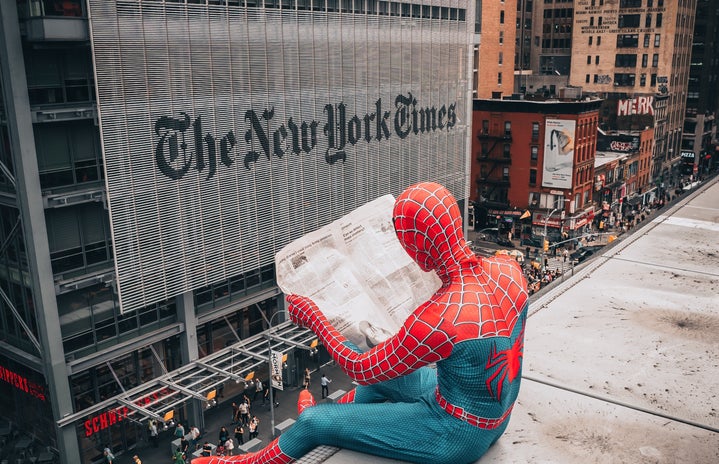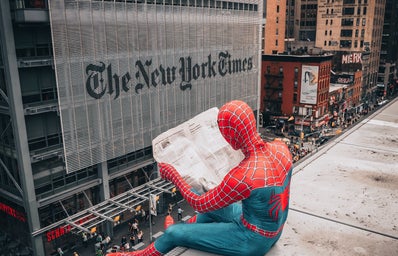Note: This article contains spoilers.
Released not long ago, Spider-Man: No Way Home has already made its mark on the screens, garnering not only record-breaking views but also the most “oh my god” moments in the history of MCU.
Truly, NWH does deliver in multiple fields, what with all the improved action sequences only being heightened by the coming together of all the Spider-Men together, hitting us with a wave of nostalgia. Doctor Strange, too, remains evergreen, if not Cumberbatch improving his performance with every movie he appears in. Even the rebirth of Green Goblin on screen can be called one of the most brilliant villains regenerated and, that too, the delivery by Willem Dafoe is nothing short of perfect. On top of that, Andrew Garfield seems far better in this Spider-Man sequel than he did in his own TASM series, particularly because of the emotional arc that his character carried in NWH, thus finally getting him the attention he deserved.
But while considering all the above-mentioned “oh my god” moments in NWH, we simultaneously also need to consider everything that went wrong with this movie, the first of all being obvious even before its release – the fact that NWH is 2 hours and 28 minutes long.
People who have been idolizing Spider-Man since they weren’t even preteens, watching a version of their favourite superhero on screen for a whopping 148 minutes sounds like heaven to them. But is it really what it is? With sloppy plotlines, disappearances of crucial characters midway only for them to resurface in between a compelling action sequence and heavily overlooking one of the most crucial scenes for the development of Holland’s Spider-Man, NWH might not be the greatest Spider-Man movie ever made, but it puts up a good fight.
The fact that this MCU movie dragged on for more than 2 hours really doesn’t work in its favour, especially because it still overlooks key scenes and portrays them as underwhelming. If you are still clueless about which scene is being talked about here, let me present a detailed argument — the scene where Aunt May dies. Everyone who has ever watched even a single Spider-Man movie knows how significant the death of a loved one is to the character development of Peter Parker. The fact that NWH focuses more on the emotions arousing in Peter due to his friends getting rejected from M.I.T. (and seriously taking up way more footage than necessary) than when Aunt May literally dies in his arms, is, for lack of a better word, kind of depressing. It is true that rejection from dream colleges really is a huge problem for people our age, but it did not need the center stage over Aunt May’s death. The entire purpose of Spider-Man movies since the beginning of time (i.e., 2002) has been to portray how Peter copes with the death of a loved one, how he grows from it and what lessons he takes from it. And then he goes on to become the friendly neighbourhood superhero. The Gen-Z factor in Holland’s Peter has been played to such an extent that the true essence of being Spider-Man was diminished.
And this is where the second wrong thing with this movie comes in — how NWH acts as a stepping stone for the MCU and does weakly as a separate movie. The second post-credit scene proves exactly this — how the main plot of NWH was made to revolve around Doctor Strange having so much power, which, granted, he does but they could’ve underplayed that, simply because we are getting a sequel with Cumberbatch too. Now, this statement is definitely arguable, and even if I am not correct, I am not entirely in the wrong either. At the end of the day, we do accept the fact that Spider-Man movies work more for the MCU now than they do for Peter Parker. NWH is more about what happens next in the MCU, and the crossover of all the Spider-Man movies and all the Peter’s coming together really doesn’t help prove this wrong. Although the crossover does earn brownie points for all the nostalgia it made us feel, the fact remains that it diminishes the entire meaning of Spider-Man movies. The multiverse plotline and the multiple Spider-Men worked best for Spider-Man: Into the Spider-Verse and the fact that they repeated somewhat of the same thing in a live-action movie doesn’t really come off too strong. A movie cannot work simply on nostalgia and Andrew Garfield giving the best performance of his life. NWH lacks the tangibility that Spider-Man movies usually have, granted, it works better as an Avengers movie, way better when compared with Spider-Man movies.
If this was not enough, I now come to the smaller, more forgivable mistakes in this movie. The first is including Sandman and The Lizard in it. Both being comparatively strong villains and also the first few ones that made their appearance next to Peter Parker all those years back, it does sound like a good idea to bring them back in the crossover of the decade. But there was no point in doing that if their only role was to take up more space in Happy’s apartment. Dr. Octo Octavius and Green Goblin truly are the villains who deserve the center stage, but that doesn’t mean that the other “oldie goldies” can be sidelined. Except for a couple of minutes of thrill, Sandman and The Lizard do not contribute to the movie at all and put up a weak fight too. All in all, all the supervillains could’ve had the attention they deserved, if only certain scenes were written well enough, because the film sure did have the minutes to adjust them.
This article, in no way, is trying to underplay everything that NWH did right. Being more consciously aware of what is right and what is wrong, being more sensitive overall and not just to the ‘good’ people, attaching importance to emotional intelligence and mostly, letting Andrew Garfield save Holland’s MJ only to give us the flashback of the year, this movie really did give us a lot of good to talk about. The only problem is, incorporating all these new dimensions into Peter’s personality only led to diminishing some of the most crucial things about what it means to be a Spider-Man. NWH could’ve been written in a way that made sure the true essence of being Peter Parker was not compromised and made sure it was “perfectly balanced, as all things should be.”


